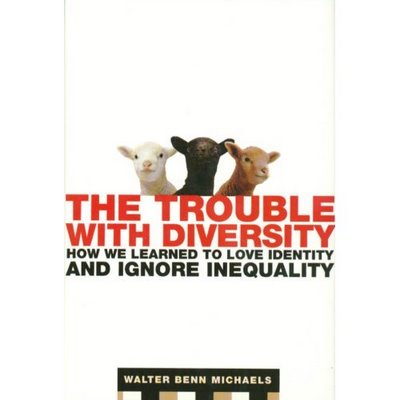Should Race Trump Class?

The Trouble with Diversity: How We Learned to Love Identity and Ignore Inequality by Walter Benn Michaels was released yesterday and offers very interesting theories about inequality in America. More specifically he posits that America has given diversity a problematic definition and writes with much chagrin that race has precluded class in terms of diversity. He further postulates that everytime we talk about race, we fail the poor. Why is it, he asserts, that discussions of race take precedence over discussions of class. In essence, the book talks about the problems Michaels sees with issues of race trumping issues of class in America.
Now, I already know that the book will be problematic for me because there is a good reason why issues of race dominate the need for diversity. Though class is an incredibly important topic, I wonder if Michaels speaks to the intersections of class and race. I wonder too if Michaels speaks to the discrimination, hurdles, and barriers to entry that many upwardly mobile people of color face. Needless to say in order to answer these questions, I need to read the book. In the meantime, what are your thoughts?
cant -- noun: 1. The idioms and peculiarities of speech in any sect, class, or occupation.2. The use of religious phraseology without understanding or sincerity. 3. Empty, solemn speech, implying what is not felt; insincere talk; hypocrisy. 4. A whining manner of speaking, especially of beggars.
"I never realized until lately that women were supposed to be the inferior sex"
--- Katherine Hepburn


1 Comments:
Race, class and gender are inextricably connected. I agree with you, Cocacy, that I need to read the book but I do wonder if Michaels’ underlying premise is flawed if he sees race trumping issues of class: “ You can’t separate the two , It’s impossible to do, JUST like the salt in the stew.” Lizz Wright from Salt
Discussions of race that don’t include class and gender are flawed, incomplete and inaccurate in my opinion so perhaps I do agree with Michaels premise in away but race can’t trump class or gender because they are all connected unless you choice not to look at those connections. What interests me also is this issue of access: do for example, poor black women, middle class Latinas or gay male teens (and their advocated and allies) have access or means to get their own stories and intellectual discourse out there? And is there a willing audience to hear that message if it does get out? Many folks don’t like talking about issues of the class because there is such a stigma on being poor in our culture. And of course, will issues of class sell? Is there a market for it? Is it sexy? Clearly focusing on race is.
In any regard, I hope his book moves thinking on the topic of race, class and gender in some illuminating direction.
Enregistrer un commentaire
<< Home